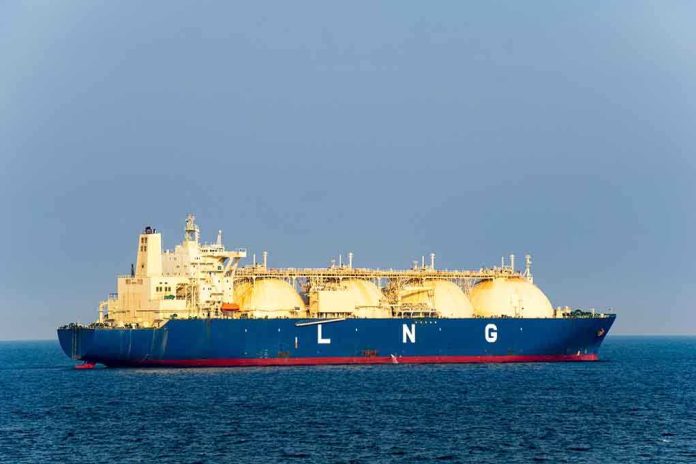🔴 Website 👉 https://u-s-news.com/
Telegram 👉 https://t.me/usnewscom_channel
Russia’s shadow fleet of LNG tankers brazenly defies Western sanctions, resuming exports from the Arctic LNG 2 project as Putin seeks to outmaneuver the Trump Administration.
Key Takeaways
- Russia has resumed LNG exports from its Arctic LNG 2 project with the arrival of the specialized tanker Iris, the first since October 2024.
- Moscow is employing a “shadow fleet” of 13 LNG vessels reflagged in non-sanctioning countries to circumvent Western sanctions.
- Storage constraints remain a significant challenge, with over 1 million cubic meters of unsold LNG from previous shipments risking production halts.
- Russia is targeting Asian markets, particularly China, to offset reduced pipeline revenues to Europe following the Ukraine conflict.
Russia’s Arctic Defiance
In a clear demonstration of Russia’s determination to undermine Western sanctions, the Kremlin has successfully restarted exports from its strategically vital Arctic LNG 2 project. The arrival of the specialized ice-class tanker Iris at the Arctic terminal marks the first successful loading operation since October 2024, signaling President Putin’s commitment to maintaining Russia’s energy dominance despite Trump administration efforts to cripple the Russian economy. This project forms the cornerstone of Russia’s ambitious plan to triple LNG exports by 2030, directly challenging American energy interests in global markets while bolstering Russia’s economic resilience against Western pressure.
The Arctic LNG 2 facility represents not just an energy project but a geopolitical statement, demonstrating Russia’s technological capabilities in harsh Arctic conditions and its ability to operate independently of Western cooperation. Operating in temperatures that can plunge to minus 50 degrees Celsius, these advanced facilities showcase Russian engineering prowess and Arctic expertise. While Western sanctions have undoubtedly created hurdles, Russia’s adaptability and determination to maintain its energy export capabilities is challenging them.
#Russia is taking another crack at expanding exports of liquefied natural gas after US sanctions stalled efforts last year.
An LNG vessel has docked at the Arctic LNG 2 export facility for the first time since October, according to ship-tracking data compiled by Bloomberg and…
— Giovanni Staunovo🛢 (@staunovo) June 29, 2025
The Shadow Fleet Strategy
At the heart of Russia’s sanctions-busting effort is a sophisticated “shadow fleet” of 13 LNG vessels that have been strategically reflagged in non-sanctioning countries. This fleet employs tactics such as ship-to-ship transfers and floating storage units to ensure continued market access despite Western restrictions. The Arc4-class ships like the Iris can navigate ice-covered Arctic waters, using the northern sea route to Asian markets during summer months. This maritime strategy demonstrates Russia’s ingenuity in maintaining export capabilities while highlighting the ineffectiveness of Biden’s energy sanctions policy.
“Russia currently has more vessels available than it did last year, and this fleet would be sufficient to transport gas, if buyers are found,” said Malte Humpert, founder of the Arctic Institute, highlighting the country’s growing logistical capacity despite Western sanctions.
Russia is also developing domestic shipbuilding capabilities to further insulate its LNG export strategy from Western pressure. “Russia’s first domestically built ice-class LNG tanker might be ready by the second half of this year,” revealed Igor Tonkovidov, CEO of Sovcomflot, demonstrating Moscow’s commitment to energy independence. This investment in indigenous technological capacity stands in stark contrast to America’s growing dependence on foreign manufacturing and energy imports under current policies, creating a troubling divergence in national industrial strategies.
Asian Markets as Sanctions Shield
Russia’s pivot to Asian markets, particularly China, represents a strategic recalibration designed to circumvent Western sanctions while maintaining critical energy export revenues. With pipeline exports to Europe severely curtailed following the Ukraine conflict, Moscow has intensified diplomatic and commercial efforts to secure alternative buyers in India and China. These emerging partnerships threaten to undermine the effectiveness of the Western sanctions regime while strengthening Russia’s geopolitical position in Asia, creating new security challenges that the Trump administration must address.
“Jan-Eric Fahnrich, an analyst at Rystad Energy, said the biggest hurdles are still finding buyers and enough shipping capacity,” revealing the central challenges to Russia’s LNG strategy despite its technical achievements.
The potential for discounted Russian LNG to enter global markets raises significant concerns about energy price stability and American competitiveness. Novatek, the majority shareholder in Arctic LNG 2, may offer substantial price reductions to entice Asian customers, potentially undercutting American LNG exports that typically command premium prices.

